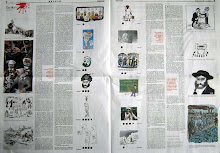I compared four different news websites: two western ones - American CNN and the British Guardian - and two eastern outlets - Russian RIA Novosti and [obviously] Chinese China Daily. While the content was similar in all four articles - after all, they all dealt with the same subject - there were few differences, which may seem minor to most audiences, and perhaps not even noticeable on the first reading. I, however, find them significant and telling of the respective news organizations' agenda, as well as the cultural context in which they operate. Before I tell you what I am referring to, here are the links to the articles for you to see whether there is anything you notice that may be relevant to the subject of my blog:
http://www.cnn.com/2010/WORLD/europe/04/06/moscow.subway.bombings/index.html?iref=allsearch http://www.guardian.co.uk/world/2010/mar/29/moscow-bombings-russia-putin-tube-train
http://en.rian.ru/russia/20100406/158452727.html
http://www.chinadaily.com.cn/world/2010-04/03/content_9683537.htm
Spot anything? The important difference I am concerned about is rather subtle - the way the country of origin of the bombers and/or the bombers themselves are described. In the articles by CNN and The Guardian, the religion is mentioned in both cases. In CNN's article, this fact is given even more prominence, and thus importance, for it appears already in the second paragraph: "Sharipova was born in the village of Balakhani, in Dagestan, a predominantly Muslim republic that lies beside Chechnya..."
Russian and Chinese news stories on the same topic, on the other hand, do NOT mention the religious affiliation of the bombers and/or the country of their origin, AT ALL. A coincidence? I know some of you may think that a mere word or two is not a big deal - "Muslim" or "Islam/Islamic" are just descriptive adjectives/nouns, right? Could be, but what if they are strategically repeated in negative contexts? Isn't that one way to create a negative connotation connected to these two words in the media audiences' heads? Isn't that a subtle way to influence the public's perception of Muslims? Please think about that the next time you read or watch the news...



Hi,MLS, your notice is high appropriate, I must say. If there is one word repeated in a special connotation and in the very same situations, it looses its lexical and even semathical meaning, it starts its independent life, with a new meaning, the verbal weapon that is. Wherever only it occurs, operates as a red flag in front of the bull eyes. I admit not all eyes are that of bulls,OK.Mine e.g.Oh yes, the seventh empire is really powerful. So, for the mext time. Now I do agree.MMLS
ReplyDelete